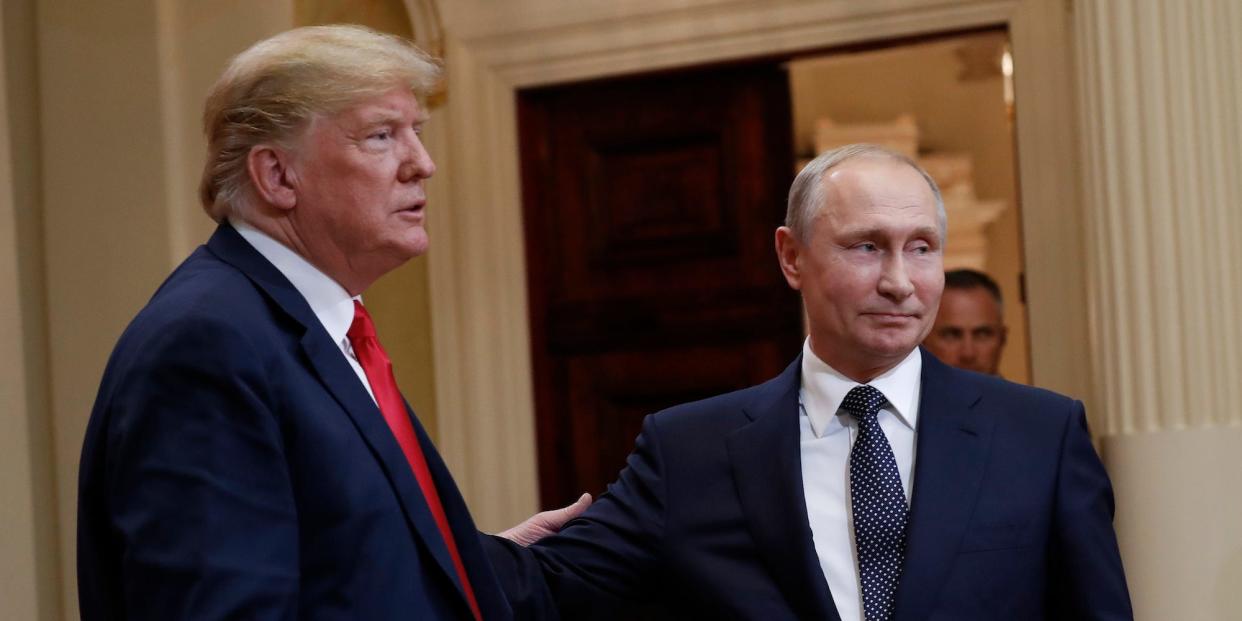Mueller's top prosecutor says Russia's election interference was 'much worse' than Pearl Harbor

Associated Press/Pablo Martinez Monsivais
Andrew Weissmann, a former federal prosecutor who worked on the special counsel Robert Mueller's team, told Insider that Russia's interference in the 2016 election was "much worse" than Pearl Harbor.
"Obviously, Pearl Harbor had a loss of life, and I'm not trying to say that's comparable, but in terms of the effect and undermining our democracy, it's arguably much worse," he said in an interview.
Weissmann recently released a new book, "Where Law Ends: Insider the Mueller Investigation," which offers a window into the inner workings of Mueller's team during the most explosive criminal investigation in recent history.
"When I was at the FBI under Director Mueller, one of the palpable things you felt was just how apolitical the institution was," Weissmann said. "It didn't matter whether somebody was a Democrat or Republican, didn't matter whether you were rich or poor, it was just about the facts."
Andrew Weissmann, a former federal prosecutor who worked in the special counsel Robert Mueller's office, told Insider that he believes Russia's interference in the 2016 election was more damaging to democracy than the surprise attack on Pearl Harbor during World War II.
Weissmann recently released a new book, "Where Law Ends: Inside the Mueller Investigation," which offers a window into the inner workings of Mueller's office as it conducted one of the most politically explosive investigations in history.
Mueller's team was tasked with investigating Russia's interference in the 2016 US election and whether members of Donald Trump's campaign conspired with Moscow to tilt the race in his favor. The special counsel also examined whether Trump obstructed justice throughout the course of the investigation.
"The first and most important part of our work was to document what Russia had done in attacking our election," Weissmann told Insider. "That's something that everybody should be able to get behind. I analogized it to Pearl Harbor. Obviously, Pearl Harbor had a loss of life, and I'm not trying to say that's comparable, but in terms of the effect and undermining our democracy, it's arguably much worse."
He added that that part of the investigation was "unfortunately tied to the second issue, which is, did anybody in the United States conspire or were they complicit" in Russia's efforts. "The second question should not affect the first one. It's wrong to think about being attacked by a foreign government in light of whether that undermines someone's legitimacy as president."
Weissmann was referring to Trump's consistent efforts to downplay or dismiss Mueller's finding that the Russian government waged an elaborate and unprecedented campaign to meddle in the 2016 election, with the explicit goal of propelling him to the Oval Office.
That finding has been corroborated by the US intelligence community as well as in a bipartisan report by the Senate Intelligence Committee.
Weissmann said that Trump's belief that digging into Russian interference undermines the legitimacy of his victory is "not the issue."
"The issue is, how do we protect our democracy from foreign interference, something which the founders were very concerned about, and in the cyber age, we need to be vigilant about," he said.
In addition to the president's own reluctance to confront foreign election interference — particularly if Russia is the culprit — multiple media reports and a whistleblower complaint from a federal employee said officials are intentionally suppressing or manipulating intelligence about Russian interference out of fear that it could anger Trump.
Last month, a former senior Department of Homeland Security official, Brian Murphy, filed a whistleblower complaint saying he was told to stop focusing on Russian election interference and to withhold intelligence assessments about the matter.
Murphy said that after he refused to follow that directive, he was excluded from key meetings on the subject and that a draft intelligence assessment detailing foreign interference ahead of the 2020 election was put together without his involvement. He believes it "attempts to place the actions of Russia on par with those of Iran and China in a manner that is misleading and inconsistent with the actual intelligence data," the complaint said.
In August, Director of National Intelligence John Ratcliffe announced that he would no longer brief Congress on foreign election interference, though he partially reversed course in mid-September, saying his office would resume briefings for the House and Senate intelligence committees.
Earlier this week, Ratcliffe again made headlines when he sent a letter to Senate Judiciary Committee chairman Lindsey Graham revealing dubious information from a "Russian intelligence analysis" claiming that Hillary Clinton "approved a campaign plan to stir up a scandal" against Trump in 2016 "by tying him to Putin and the Russians' hacking of the Democratic National Committee."
Ratcliffe declassified the information despite the fact that the US intelligence community "does not know the accuracy of this allegation or the extent to which the Russian intelligence analysis may reflect exaggeration or fabrication," according to the letter.
Ratcliffe's move raised immediate questions about why the country's top intelligence official declassified information that the US could not corroborate, and which Ratcliffe himself acknowledged could be false or exaggerated. Moreover, as several observers pointed out, Ratcliffe's decision to release disparaging information about Clinton from Russian intelligence sources appears to mirror Moscow's ongoing disinformation campaign against the former secretary of state.
"One of the grave things that's happened in the last few years is the politicization of intelligence agencies and information," Weissmann said when asked about these developments. "When I was at the FBI under Director Mueller, one of the palpable things you felt was just how apolitical the institution was. It didn't matter whether somebody was a Democrat or Republican, didn't matter whether you were rich or poor, it was just about the facts."
Read Business Insider's full interview with Weissmann here.
Read the original article on Business Insider

